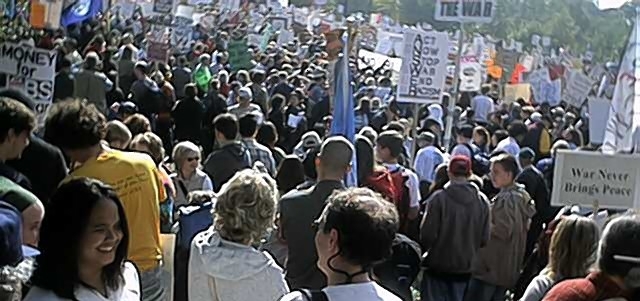
Written: 11/19/2002
Published in The People’s Civic Record, a monthly, Wilmington, NC based progressive magazine.
FRIDAY NIGHT, OCT. 25TH
I was in a horrible mood. I had been driving through blinding rain and fog in heavy traffic through most of Virginia. It seemed to only get worse as I got closer to my destination. I was driving up I-95 on my way to Washington D.C. to attend an anti-war demonstration.
I was wondering if it was worth it.
Congress had already abdicated its Constitutional duty to decide when to wage war, giving a blank check to Bush to pursue it at his discretion. I had hoped that the people opposed to this would have a chance to look their representatives in the eye before they reached a such an important decision.
A few email write-in campaigns against the war had begun to sway some in Congress. The issue passed with less votes in the House than initially expected because of them. Links to the email campaigns were spread by anti-war, peace, and “liberal” websites on the Internet, as well as the word of future anti-war demonstrations.
Unfortunately, it was too late.
Senator Robert Byrd, from West Virginia, had made a valiant effort to dissuade his fellow legislators with some courageous and eloquent speeches, pointing out the Constitutional authority to wage war rested in the legislative branch of government, not the executive. Quoting Madison and Lincoln, he had accused the President of “hubris” (hubris: “to rush at impetuously” wanton insolence or arrogance resulting from excessive pride or from passion). His words seemed to fall on many deaf ears. With the mid-term elections at hand, Democrats were too fearful to challenge a popular President, who seemed ready to wage war regardless of Congressional or international blessing. They were as eager to get this issue out of the way before elections as Bush was eager for them to rubber stamp his agenda.
Earlier that day, Senator Paul Wellstone, from Minnesota, an unabashed and extremely principled liberal, who had also stood against the rush to war, had been killed in a small plane crash. His first speech, as a member of Congress, had been opposing the first war against Iraq; his last speech opposed a second one.
This protest seemed a feeble attempt to counter Bush’s new National Security Strategy, which promotes the un-American and unchristian idea of doing unto others BEFORE they MIGHT do unto you, and the public’s seeming enthusiastic support for war, which had left me feeling isolated throughout the past year or more.
I partly blamed the media for its lack of coverage of dissent and lack of in-depth analysis about what was going on. I was angry that they weren’t making more out of the Bush administration’s policies, casting aside international and Constitutional law. I didn’t understand why they were failing to insist that Bush explain, and more fully define, his “war on terrorism” and his overall objectives in clearer terms than going after “evil-doers.” How could they not question Bush’s statements about the UN being irrelevant if it didn’t enforce its resolutions against Iraq, when somehow it is not irrelevant when it doesn’t enforce the resolutions against Israel? Where was the outrage when it was revealed that the Bush administration withheld the information that North Korea had WMDs (weapons of mass destruction) from the Congress and the American public until after the Senate vote giving him the power to go into Iraq? I was shocked that the same papers and columnists, who earlier reported that the inspectors themselves finally decided to leave Iraq in 1998, because of the lack of cooperation of the Iraqi government, were now spinning the lie that Iraq had “kicked” them out. I was discouraged with the lack of coverage regarding how the unilateral actions of this administration were making even countries friendly towards us highly uncomfortable. And I didn’t know why massive protests overseas by hundreds of thousands were barely making the news (a British protest against fox hunting, a few weeks earlier, had received much more coverage than a British antiwar protest which drew over 400,000 people, which occurred on the same day).
With the Congress and the media abdicating responsibility and a feeling of futility, I drove into Washington in the rain.
SATURDAY, OCT. 26TH
By Saturday morning, the rain had stopped, but it was still cloudy and overcast when I took the Metro into the heart of the city. I was heading to Constitution Garden Park, adjacent to the Vietnam Memorial where the protest was centered.
When I arrived, I breathed a sigh of relief. There were already several hundred people there. I let go of my worst fear, that this would be a wash-out.
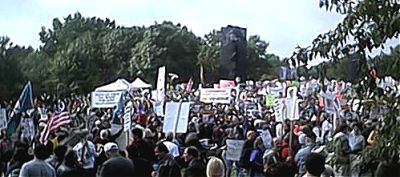
It wasn’t long before the speakers started and the crowd began to swell into the thousands on the wet and muddy grounds.
The demonstration seemed to involve many disparate groups. Many with different additional agendas besides peace. For some, peace is not even on their agenda. They were just trying to use the anti-war movement to market anti-establishment ideas and felt that they can find likely customers among dissenters. There were the expected socialists and Greens and anarchists (oh, my!), but there were also people who are trying to prove things like the Kennedy assassination was part of a plot to undermine Asians (an actual argument someone was presenting at the march). With all the kooks and crazies globbing on, it makes it easy for the “establishment” to mock the whole cause, but it may be an unavoidable aspect of any protest of this type.
The International A.N.S.W.E.R. (Act Now To Stop War and End Racism) Coalition was the primary organizer of the event. It seems they have some associations with former Attorney General Ramsey Clark, founder of the New York-based International Action Center (IAC).
Mirror demonstrations were being held in other cities across the country and across the world that day in San Francisco, New York, San Juan, Berlin, Stockholm, Madrid, Tokyo, and Manila, to name some of the more significant, but I felt this one was the most important. This one was going to look them in the eye.
Not In Our Name (a group of prominent Americans including; Edward Asner, Noam Chomsky, Casey Kasem, Rabbi Michael Lerner, Gloria Steinem, and Howard Zinn – among many others) were the hosts of the protest in New York.
It is difficult to assess the power possessed by each of the scores of “umbrella” organizations for peace like A.N.S.W.E.R. or Not In Our Name and it is possible that an inadequate or inappropriate group may succeed in pulling off an event – and gain power – because of their marketing ability, not because of their competence in other areas.
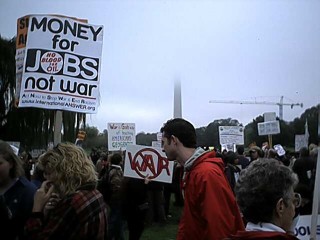
In spite of the diversity of groups and their perspectives, the driving force behind the turnout could be found in the people who came. It wasn’t just the kooky, weird looking people that CNN might tend to focus on to make for better TV in their coverage. It was the mothers and nuns and veterans and “regular” people from all over the country, who felt that this war was wrong. Many people at the march didn’t know anything about A.N.S.W.E.R. or many of the other groups vying for attention, but everyone seemed incredibly relieved with the turnout. They no longer felt alone in their objection to war and it gave everyone some hope for the future – something sadly lacking in the current administration’s vision for it, i.e.: that we have to learn to expect terrorism.
I talked to one gentleman who had come on a bus from Tennessee. He had brought an American flag to carry and wave at the rally. He was trying to illustrate that you can be a patriot, and still oppose the policies of the current administration BECAUSE you love your country.
I also saw someone carrying a large North Carolina state flag and I knew that a local Wilmington peace group called P.E.A.C.E. (People Educating with an Active Commitment to Equality) was there as well, so my state and city were well represented.
By midday, the overcast skies and morning fog had burned away and the sun was shining. It had become a beautiful, clear and comfortable autumn day as the crowd continued to swell. There were people as far as I could see. I walked to the edge of the park and looked out across the water. I was surprised to see people gathered all around the banks, too far away to hear the speakers, but unable to get closer because of the crowd size.
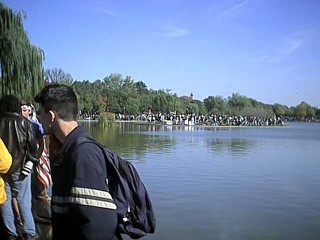
The anti-war protest in Washington turned out to be the largest demonstration against war in America since the late 1960s protests against the war in Vietnam. Full media coverage was provided by C-Span and Pacifica Radio, who estimated the crowd gathered to protest at over 200,000. Limited or cursory news coverage was made by the commercial media – who variously reported figures anywhere from “hundreds and hundreds” to “thousands” to “tens of thousands” to “over 100,000.” Apparently, the figures reported depended on when they dropped by to make their report – the crowd grew as the day went on and it doesn’t seem they could spare someone to take eight hours or so to give an accurate reporting of events. I know NBC failed to even mention it on their nightly newscasts (perhaps because there weren’t any bombs or bullets involved).
Considering all the various reports, including comments reported by Police (estimating over 100,000 to over 150,000) and my own experience with concert and sports crowds, I estimate that there were at least 130,000 to 150,000 protesters at its peak and I could not see them all.
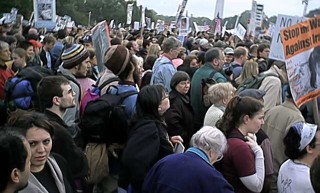
Many people spoke at the rally. Maybe there were too many, as the crowd was ready to march at least an hour before the speakers were through and began drifting away from the stage to march before the organizers were ready. The speakers were not of one voice on all points either. For example, Jesse Jackson said the previous war with Iraq was justified, Ramsey Clark said that it wasn’t. I think there was a power play there, among the various speakers and groups that wanted to be recognized, and some were using the event for their own political purposes. A.N.S.W.E.R. allowed for the different voices. I’ve since heard criticism “from the left” regarding A.N.S.W.E.R. allowing one speaker or another to speak, but my thought about that was, “why didn’t they step up to the plate?”
The speakers included Jesse Jackson, Susan Sarandon, Al Sharpton, Congressmember Cynthia McKinney, former U.S. attorney general Ramsey Clark, singer Patti Smith, Secretary-General of the International Longshore Workers Union Local 10 Clarence Thomas, Mahdi Bray of Muslim American Freedom Foundation, attorneys Leonard Weinglass and Lynne Stewart, Ben Cohen of Ben & Jerry’s, Ahmed Al-Awazza of the Muslim Students Association, Michael Letwin of New York City Labor Against the War, youth organizer for A.N.S.W.E.R. Peta Lindsay, and author Leslie Feinberg.
As much as I might disagree with someone like a Jackson, a Thomas, or a Sharpton on some issues, they made eloquent speeches and, at least, they stepped up to the plate.
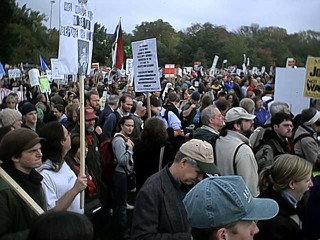
After too many speeches, we finally marched. Well, at first, those at the tail of the march stood for about 1/2 hour, as the march was so large that there was a temporary gridlock, when protesters at the head of the march returned to Constitution Avenue on their way back, they had to wait to allow demonstrators at the tail of the march to pass.
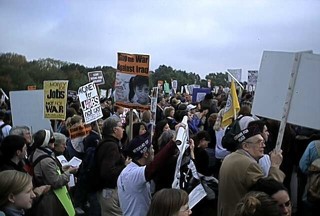
The NY Times, who had vaguely reported that “thousands” attended the rally in the next day’s Sunday paper, was so deluged with complaints regarding its coverage that it did a follow up piece on Wednesday. Here’s how they described it in the second report:
“The demonstration on Saturday in Washington drew 100,000 by police estimates and 200,000 by organizers’, forming a two-mile wall of marchers around the White House. The turnout startled even organizers, who had taken out permits for 20,000 marchers. They expected 30 buses, and were surprised by about 650, coming from as far as Nebraska and Florida.”
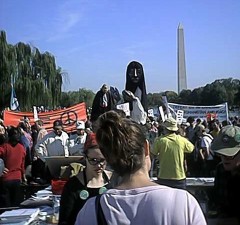
The crowd was entirely peaceful and included all ages and races. People even brought their children. In spite of the various agendas by various groups and speakers, the majority of the people, who had come out to made this demonstration a success, were united against war and united in a desire for peace. That unity of feeling ultimately overcame everything else.
This is me with my sign. The picture was taken as the march was breaking up.

There were no clashes with police and I was glad and relieved the “peace” demonstration had been entirely “peaceful.” Overall, it had been a positive demonstration instead of a negative one and, with the numbers of people involved, I felt that we had made a statement that was bound to be heard.
AFTERWARDS
As I left the city on Monday morning, the rain started again and, by then, I had discovered that the event wasn’t very well covered at all. It was several years into the Vietnam war before a protest of this magnitude occurred and this protest had been largely ignored by the media. It was amazing to me, when I came home to Wilmington, to find that many people here hadn’t heard a thing about it. It was even more disheartening after November 5th and the mid-term elections, when Republicans took control of the Senate, giving them control of all three branches of government and leaving the country without any checks or balance – or even a token alternative to the dim prospects offered by those who now hold our future in their hands.
But there is one thing different that I know now that I didn’t know before, that is; there are a lot of people who are as opposed to the bill of goods being offered to us as I am, and our numbers will do nothing but grow. Our message will be heard. If not through the mainstream media, then by other means. Eventually, we will not be ignored.
There will be another protest in Washington on January 18-19, and more people will know and more people will come.
Progressives of every stripe must have the courage of Robert Byrd to reclaim the moral and patriotic high-ground from those that are using those ideas merely to undermine them. They must seize this moment to make a better world and offer a brighter future and greater vision than is being offered to us.
The People must not abdicate their responsibility.
Paul Wellstone is dead, but his message did not die with him.